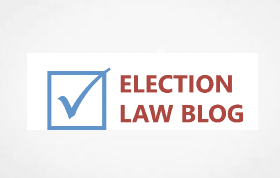I am very pleased to welcome to ELB Book Corner several contributors to The Oxford Handbook of American Election Law (Eugene D. Mazo ed. 2024). The 30% discount code for ELB readers is ALAUTHC4. The sixth contribution is from Mark Alexander:
Campaigns rely on lawyers, although you rarely see them. In rare cases, the public hears about the efforts of campaign lawyers like Sidney Powell, John Eastman, and Rudy Giuliani, who tried to overturn the results of the 2020 election. These campaign lawyers made the news when they breached their ethical and legal duties, doing what campaign lawyers are not supposed to do. In most campaigns, campaign lawyers work behind the scenes. They have responsibilities that are wide-ranging, touching on both election-specific and more general legal matters.

The campaign lawyer focuses most of her energy on voters and ballots. This work begins in the early stages of a campaign. To ensure that a candidate’s name appears on the ballot, a campaign lawyer must often navigate arcane state and local rules. Once her candidate is on the ballot, the campaign lawyer must protect the campaign’s most valuable assets—a candidate’s supporters—by ensuring that they are registered to vote and have access to the polls. The campaign lawyer works most intensely in the time leading up to an election, must be available on Election Day, and the job now increasingly extends beyond Election Day as well.
The drama of the 2000 presidential election and the litigation leading up to Bush v. Gore brought campaign lawyers into our living rooms for the first time. In 2000, the winning presidential candidate needed to carry Florida, where a tiny fraction of the vote separated George W. Bush and Al Gore. Each day, the nation watched as local election officials tried to determine the intent of voters who used punch-card ballots to vote. The two sides’ campaign lawyers played a pivotal role in the drama. Eventually, the Supreme Court stepped in. In Bush v. Gore, the Court found that there is no individual right to vote for a presidential candidate. But it also said that if a state happens to grant this right, it must be protected. The Court held that a state’s election must be guided by consistent rules, and that Florida’s recount procedures lacked the minimal safeguards needed to treat voters equally. On this basis, the Court halted Florida’s recount, effectively determining the result of Florida’s election. Among other things, the drama leading to Bush v. Gore highlighted the important work that campaign lawyers do in advocating for their clients.
These days, money is everything in campaigns. It pays for media, travel, staff, offices, and more. The campaign lawyer must ensure that a campaign follows the applicable contribution limits, expenditure rules, and disclosure regulations. It is the campaign lawyer’s job to make sure that a campaign’s funds are properly received, spent, and reported. In a world where independent expenditures have come to represent the lion’s share of election spending, campaign lawyers must also ensure that there is no coordination between the campaign and third-party spenders.
The campaign lawyer is a kind of legal acrobat. When she offers her knowledge of state and federal election law, as well as of constitutional law, she acts as a specialist. But beyond that, the campaign lawyer must also be a generalist. A campaign lawyer often reviews leases, drafts employment contracts, and secures intellectual property rights. Further, she is often called upon to provide general advice as an integral member of the candidate’s senior leadership team. She also often performs other miscellaneous tasks, like debate prep, policy planning, and fundraising.
My chapter for the Oxford Handbook of American Election seeks to situate the role of the campaign lawyer within our field’s growing literature. It argues that campaign lawyers are an integral part of the electoral process. Their work allows campaigns to function, voters to cast their ballots, and the public to have faith in our elections. Just as importantly, at the end of every campaign, the campaign lawyer must uphold her broader professional obligations and ethical duties to the country and the Constitution—regardless of who wins.




